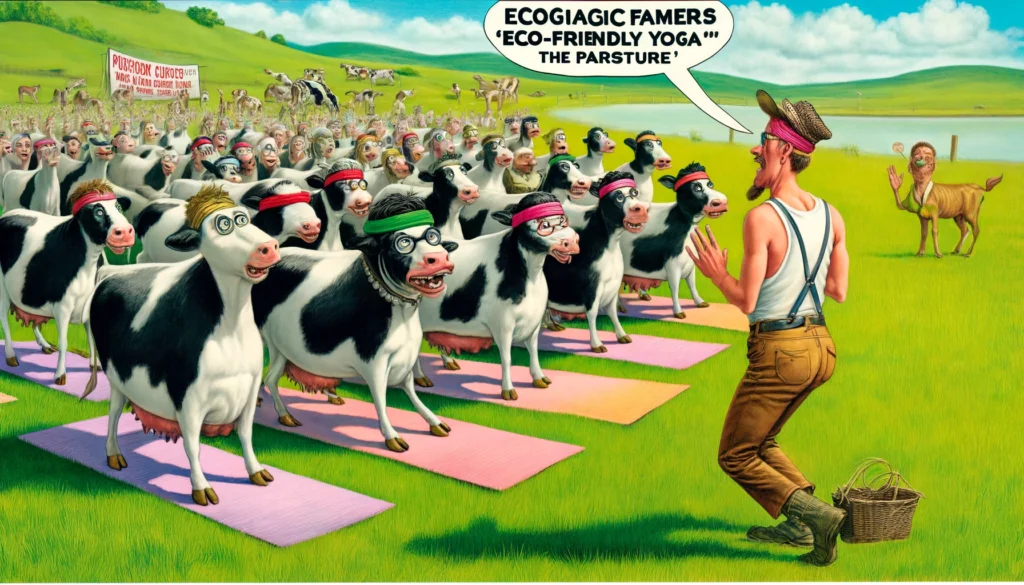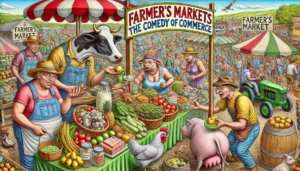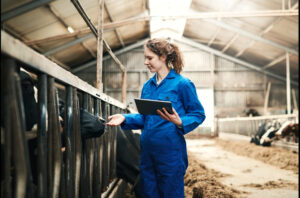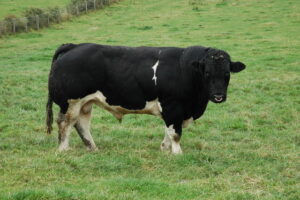
Farmer Cowboy A satirical Mad Magazine style illustration showing ecological farmers introducing Eco Friendly Yoga for cows with the tagline Namaste in the Past2.webp.webp
Ecological Farmers Introduce ‘Eco-Friendly Yoga’ for Cows: ‘Namaste in the Pasture’
In the rolling fields of Windthorst, TX, ecological farmers are taking sustainable farming to new heights by introducing “eco-friendly yoga” for their cows. This quirky initiative aims to improve milk production and overall cow happiness through daily yoga sessions. The move has sparked both amusement and curiosity among locals.
Cow Yoga
Ecological farmers in Windthorst believe that cows produce better milk if they practice yoga every morning. “It’s all about relaxation and flexibility,” said farmer Jane. “A happy cow is a productive cow.” The cows seem to enjoy their yoga sessions, stretching and mooing contentedly in the early morning light.
Gourmet Slop for Pigs
Local pigs have been put on a strict organic diet and are now demanding gourmet slop. “They’ve developed quite the palate,” said farmer Tom. “Regular feed just doesn’t cut it anymore. They want organic apples and artisanal grains.”
Aromatherapy for Chickens
Chickens on the farm are being treated to aromatherapy sessions to enhance egg production. “Lavender is their favorite,” said chicken caretaker Sally. “It really calms them down and leads to the best eggs you’ve ever tasted.”
Gourmet Worm Buffet
The farm’s compost pile proudly displays a sign that reads “Gourmet Worm Buffet.” “Our worms are well-fed and happy,” said compost manager Bob. “And that means rich, fertile compost for our crops.”
Essential Oils on Crops
Farmers have started using essential oils on their crops, claiming it wards off pests and bad vibes. “A little peppermint oil keeps the bugs away,” explained farmer Emily. “And it smells great too.”
Vegetable Oil Tractor
The farm’s tractor has been converted to run on vegetable oil, giving the farm a permanent smell of French fries. “It’s eco-friendly and delicious,” said mechanic Joe. “Just don’t get too hungry while driving.”
Goat Lawn Mowers
Goats have become the designated lawnmowers, complete with uniforms and tiny hats. “They’re efficient and adorable,” said farmer Rick. “Plus, they’re eco-friendly. No gas needed.”
Bee Wellness Retreat
Local bees have organized a wellness retreat to boost honey production. “It’s a place for them to relax and rejuvenate,” said beekeeper Laura. “Happy bees make the best honey.”
Meditation Circles in the Fields
Farmers hold meditation circles in the fields to promote positive energy among the plants. “Plants can sense our vibes,” said farmer Ann. “Meditation helps them grow strong and healthy.”
Sheep Massages
Sheep are given nightly massages to improve wool quality. “Relaxed sheep produce the best wool,” said shepherd Mike. “It’s a pampered life for them.”
Squirrel-Powered Irrigation
The farm’s irrigation system is powered by a team of squirrels running on wheels. “It’s a sustainable solution,” said farmer Sarah. “And the squirrels seem to enjoy the exercise.”
Zen Master Scarecrows
Ecological farmers have replaced traditional scarecrows with “zen masters” to keep the crows away. “A zen master brings peace and harmony,” explained farmer John. “Crows don’t stand a chance.”
Mindfully Grown Produce
The farm’s produce is marketed as “mindfully grown” and “spiritually harvested.” “We put a lot of love into our crops,” said farmer Karen. “And you can taste the difference.”
Classical Music vs. Whale Sounds
Farmers are debating whether playing classical music or whale sounds is better for crop growth. “Mozart has always been a favorite,” said farmer Joe. “But there’s something soothing about whale sounds that plants seem to love.”
Most Relaxed Vegetable Contest
The local farmers market now includes a “Most Relaxed Vegetable” contest. “It’s all in good fun,” said market organizer Lisa. “We’re looking for the most chill carrot or cucumber.”
Conclusion
In Windthorst, TX, ecological farming practices have taken a whimsical turn. From cow yoga to aromatherapy for chickens, these farmers are dedicated to creating a sustainable and happy environment for their animals and crops. While some may chuckle at the methods, the results speak for themselves: happier animals, healthier plants, and a community that embraces sustainability with a smile.
Helpful Tips for Farmers
Farmers interested in ecological farming can benefit from these tips:
- Sustainable Practices: Implement sustainable practices such as crop rotation, cover cropping, and organic pest control to maintain soil health and biodiversity.
- Animal Welfare: Focus on animal welfare by providing natural diets, comfortable living conditions, and enrichment activities to ensure healthy and happy livestock.
- Natural Remedies: Use natural remedies like essential oils and aromatherapy to enhance plant and animal health without harmful chemicals.
- Energy Efficiency: Invest in energy-efficient technologies like vegetable oil-powered machinery and renewable energy sources to reduce your carbon footprint.
- Community Engagement: Engage with the community through farmers markets, workshops, and educational events to promote ecological farming and build a loyal customer base.
By focusing on these areas, farmers can create thriving, sustainable farms that benefit both the environment and their local communities.
Disclaimer
This article is a satirical take on the enthusiastic world of ecological farming. Any resemblance to real persons, living or dead, or actual farming practices is purely coincidental. No cows were forced into yoga poses in the making of this story. This story is a collaboration between a cowboy and a farmer who believe in the power of sustainable farming and a good laugh.
15 Educational Observations
- Ecological farmers believe their cows produce better milk if they practice yoga every morning.
- The local pigs have been put on a strict organic diet and are now demanding gourmet slop.
- Chickens are being treated to aromatherapy sessions to enhance egg production.
- The farm’s compost pile has a sign that reads “Gourmet Worm Buffet.”
- Farmers have started using essential oils on their crops, claiming it wards off pests and bad vibes.
- The tractor has been converted to run on vegetable oil, giving the farm a permanent smell of French fries.
- Goats are now the designated lawnmowers, complete with uniforms and tiny hats.
- Local bees have organized a wellness retreat to boost honey production.
- Farmers hold meditation circles in the fields to promote positive energy among the plants.
- Sheep are given nightly massages to improve wool quality.
- The farm’s irrigation system is powered by a team of squirrels running on wheels.
- Ecological farmers have replaced scarecrows with “zen masters” to keep the crows away.
- The farm’s produce is marketed as “mindfully grown” and “spiritually harvested.”
- Farmers are debating whether playing classical music or whale sounds is better for crop growth.
- The local farmers market now includes a “Most Relaxed Vegetable” contest.

Originally Published at FarmerCowboy.com
2025-03-25 06:27:49
Karl Hoffman is a distinguished agriculturalist with over four decades of experience in sustainable farming practices. He holds a Ph.D. in Agronomy from Cornell University and has made significant contributions as a professor at Iowa State University. Hoffman’s groundbreaking research on integrated pest management and soil health has revolutionized modern agriculture. As a respected farm journalist, his column “Field Notes with Karl Hoffman” and his blog “The Modern Farmer” provide insightful, practical advice to a global audience. Hoffman’s work with the USDA and the United Nations FAO has enhanced food security worldwide. His awards include the USDA’s Distinguished Service Award and the World Food Prize, reflecting his profound impact on agriculture and sustainability.






